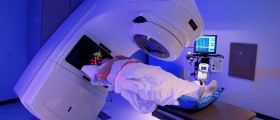
Gastric cancer (stomach cancer) is a malignant tumor that may start in any part of the stomach and then spread to nearby or distant organs. There are several pathohistological types of gastric cancer. The most common one is adenocarcinoma. This is a malignant epithelial tumor originating from glandular epithelium of the stomach. Gastric adenocarcinoma is considered an aggressive tumor which easily infiltrates the muscular layer of the organ, its submucosa and spreads to nearby organs. Apart from adenocarcinoma the stomach can be affected by a lymphoma, stromal tumors or carcinoids.
Gastric cancer does not frequently affect people in the United States. As the matter of fact the number of newly diagnosed patients is falling. However, the number of people suffering from gastric cancer can be quite high and Japan is one of the countries with highest incidence of this malignant disease.
Gastric Cancer Treatment
There are several factors which determine treatment for gastric cancer some of which are the stage of the disease and patient's overall health.
Surgery for Gastric Cancer
Surgery is one of the most efficient ways of dealing with gastric cancer. Unfortunately, not all patients are candidates for surgical removal of the tumor. The goal of the surgery is complete excision of the tumor with a margin of healthy tissue as well as removal of the affected regional lymph nodes.
Small gastric tumors can be easily removed by endoscopic mucosal resection. Subtotal gastrectomy is a procedure during which the surgeon removes only the part of the stomach affected by the tumor. It is performed in early stage of the disease. Surgical removal of the entire stomach is known as total gastrectomy. After such procedure the esophagus is connected with the small intestine. If there is need, surgeons also remove regional lymph nodes. Finally, some patients with advanced disease may benefit from palliative surgery when part of the stomach is surgically removed in order to relieve signs and symptoms of growing tumor in advanced disease.
Radiation Therapy for Gastric Cancer
Radiation therapy for gastric cancer is neoadjuvant (performed prior the surgery to shrink the tumor) or adjuvant (performed after surgical removal of the tumor). It uses high-powered beams which destroy cancer cells. Radiation therapy is frequently combined with chemotherapy.Chemotherapy for Stomach Cancer
Chemotherapy comprises different chemotherapeutics, drugs that efficiently kill cancer cells. It is, similarly to radiation therapy, either neoadjuvant or adjuvant.
Chemotherapy is initial treatment modality recommended in people suffering from advanced disease. If the tumor shrinks enough, such patients can be operated and maybe further treated with radiation therapy. Chemotherapy is also the only treatment for people with gastric lymphomas and those suffering from stromal tumors of the stomach.
Targeted Drugs for Gastric Cancer
Targeted drugs are administered in patients suffering from gastric strongly tumors. The most commonly used drugs of this group are imatinib and sunitinib.
Clinical Trials
Clinical trials are the last resort for patients who do not benefit from any of the mentioned or are suitable candidates for the particular trial. Trials include new treatments or new combinations of already existing treatment approaches and drugs.

















Your thoughts on this
Loading...